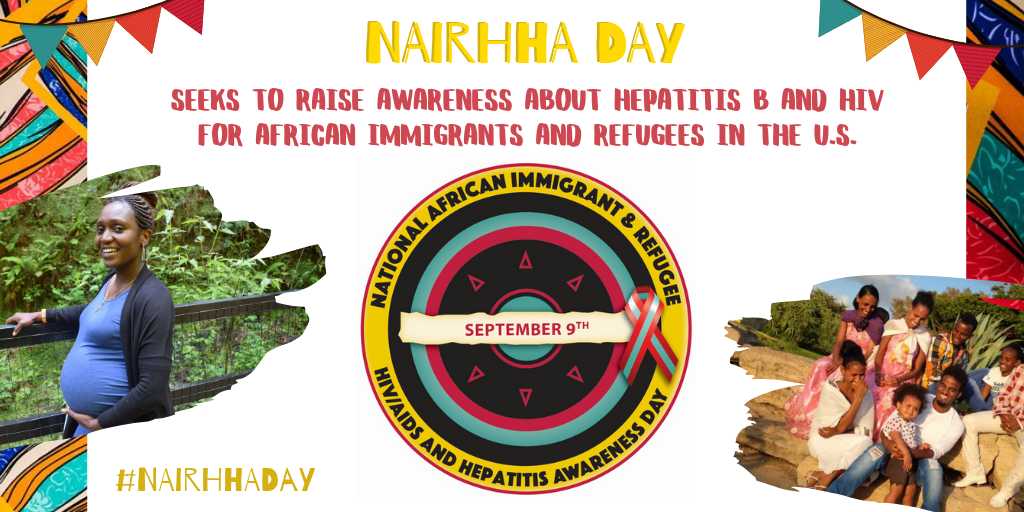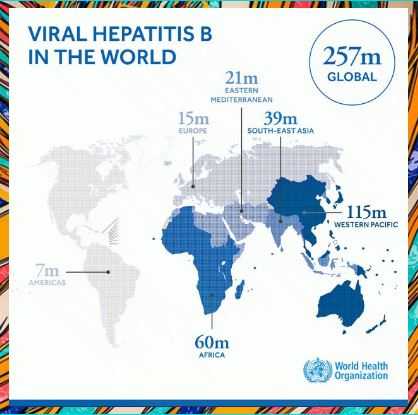The Coalition Against Hepatitis for People of African Origin (CHIPO) is a national community coalition that is co-founded and led by the Hepatitis B Foundation and is comprised of organizations and individuals who are interested in addressing the high rates of hepatitis B infection among African communities in the U.S. Over the past year, CHIPO has grown its membership to include over 50 community-based organizations and federal agencies, all of which are working to meet the common goals of raising awareness about hepatitis B among African immigrant communities, and increasing rates of screening, vaccination, and linkage to care. This month, we are excited to highlight the work of one of our newer national partners, the United States Coalition for African Immigrant Health, Inc., (USCAIH) and their Executive Director, Janet Afoakwah. Please enjoy a recent interview with Janet, as she describes her work, including successes and challenges, and the positive impacts she and USCAIH have had through their annual conferences and upcoming plans for expanding their portfolio and mission.
Could you please introduce yourself and your organization?
My name is Janet Afoakwah, and I am now the Executive Director of the United States Coalition for African Immigrant Health (USCAIH), previously known as the United States Conference on African Immigrant Health. USCAIH began as the National African Immigrant Project in 2005, supported by the U.S. Office of Minority Health, which provided a platform for national and regional conferences focused on African immigrant (AI) health. These conferences continue to be held on a yearly basis and attract a broad range of attendees, including federal agencies, academicians, researchers, policy makers, public health officials, students, community organizations, and a variety of other stakeholders. We are very excited because this year, in addition to hosting our annual conferences, we are going to be broadening the scope and focus of our work to include other services.
Could you tell me a little bit about what some of USCAIH’s programs are that specifically address hepatitis and other health concerns in African communities?
As we move forward into 2023 and beyond, USCAIH is going to be working toward achievement of some broader goals, including coalition-building; providing technical support to organizations working with AI communities; offering trainings and support in cultural sensitivity for direct-service organizations, especially those working in the areas of HIV and hepatitis, since this is such a crucial component of engaging with AI communities; organizing and expanding our website with important and relevant resources; collaborating and forming partnerships with like-minded organizations; inviting researchers to share their work with the community via a new podcast format; and providing a database where researchers working on AI health can consolidate their findings for direct use and application within communities. Data and research about African immigrants often are not disaggregated from that about African American and Black populations, so getting a clear picture of the health and health disparities impacting AI communities can often be difficult.
Is USCAIH focused in a specific geographic area or does it have more of a national reach?
Our conferences are both regional and national, and we also try to include researchers and organizations from many countries within Africa itself. The other services that we are hoping to expand will be focused on AI communities within the U.S., but all around the country.
Which countries are primarily represented in the African diaspora that USCAIH serves?
We work with folks from all countries and communities. We have been able to reach some communities a bit more effectively, due to existing relationships that our staff has with community members, but our hope is to eventually reach all AI communities within the U.S.
What are some of the biggest challenges in addressing hepatitis and other health concerns at the community level? How have you worked to overcome these? Are there any additional resources that would be helpful to have?
The biggest missed opportunities are in vaccination and screening for both hepatitis B and liver cancer. This gap is due to a variety of reasons, including general lack of health insurance and lack of funding for supportive programs, as well as inequities in healthcare access in general for many immigrant communities, which contribute to greater health disparities. Another large barrier is the lack of provider knowledge about the high risk of hepatitis B in AI communities.
The best ways to overcome some of these challenges are in the creation and sustainability of programs that are centered on AI communities and are culturally and linguistically competent – this is SO important. Another key element in breaking some of the barriers around cultural humility and especially provider awareness is in establishing partnerships and effective collaborations. Building awareness among trusted community and faith leaders, who in turn can pass this on to community members, is also critical. We have been able to launch and disseminate a podcast that covers health issues affecting AI communities, and we try to feature researchers and guests with lived experience of different health challenges, including hepatitis B, in order to raise awareness, dispel myths and misperceptions, and bring the severity of different health concerns into perspective. We are also working to consolidate resources on our website and to have all partners providing direct services around the country listed on there for easy navigation and connection.
Other more broad-sweeping, policy-level changes that need to happen include making hep B screening recommendations universal for all adults; and improving and centralizing linkage to care systems.
What do you think are some of the biggest barriers in raising awareness and addressing rates of hepatitis screening and linkage to care at the local, state, and federal levels? Do you think more could be done in these spheres to address this problem?
This is a big concern and one of the steps we have recently taken to address this is hosting a roundtable discussion intended to educate healthcare providers and professionals about hepatitis B and how to care for community members who might be living with HBV. Better provider education and linkage to care needs to be the order of the day. Community-based organizations should be supplementing the services that providers are offering. One big important change that can occur is for electronic medical records to include an automatic question about hepatitis B screening for all patients. All of this can be done with additional funding and support from the federal and state levels.
Do you see this issue as being connected to other concerns facing African immigrant communities?
Yes, there are a variety of health concerns that face AI communities in the U.S, many of which require similar approaches of cultural sensitivity and community and provider awareness to address. These include diabetes, heart disease, hypertension, and various forms of cancer.
What are your favorite parts about your job? What got you interested in this work?
I am passionate about hepatitis B and that is what actually got me into public health. I came into this work having previously led an HIV project at another organization. I love every aspect of my work! My favorite moments are in organizing conferences because they move so fast, have many moving parts, and are SO rewarding! These conferences are widely recognized as the premier gathering for discussing AI health – many organizations of all types are interested in presenting and sharing their work. The conference planning is tremendously collaborative and is an all-volunteer effort. Now, as Executive Director, I can see the whole picture of the conferences and the organization as a whole and am so excited to continue to be working on our old and new endeavors. Hosting the podcast has been a great experience as well, and a wonderful tool to interview a variety of people working in AI health, to raise awareness about important health topics like hepatitis B and to amplify the mission of USCAIH.
Any other thoughts or ideas you’d like to share for improving health and closing health disparities among African immigrant communities in the U.S.?
I just want to emphasize the importance of practicing cultural and linguistic competency, and of working in collaboration and establishing relationships with a variety of partners (including community- and faith-based organizations, health centers, and providers) and how important this is for community work. Establishing trust (which requires time and patience) and providing appropriate resources also cannot be overstated. Continuing to host conferences in order to have a space where ideas can be shared and collaborations can happen is key, and hopefully we can all work together to develop and execute a strategic plan of sorts for improving health and eliminating disparities in African immigrant communities in the U.S.
Thank you so much for taking the time to speak with me today and for sharing more about the great work USCAIH has done and will continue into the future!
Thank you!








 HIV and viral hepatitis. Advocates for NAIRHHA Day recognized the need to address these health issues in the community and thought that a combined awareness day would be the most effective way to reach the largest number of people impacted.
HIV and viral hepatitis. Advocates for NAIRHHA Day recognized the need to address these health issues in the community and thought that a combined awareness day would be the most effective way to reach the largest number of people impacted.